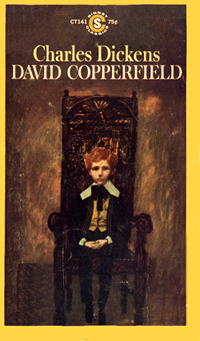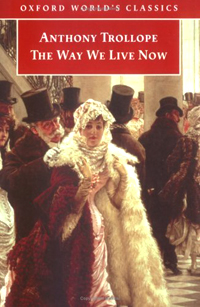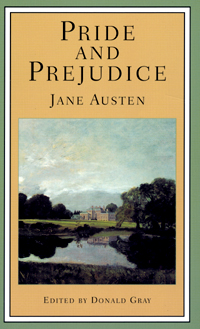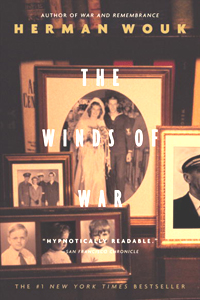 |
| |
| |
 DAVID COPPERFIELD DAVID COPPERFIELD
by Charles Dickens
This is one of my favorite books. I picked up a used copy in high school (don't ask me why!) and read it. It took me three months, but I loved it. The book is densely populated with entertaining characters. There is plenty of action, and Dickensí use of words is amusing.
A warning. 19th century English novels are wordy and digressive by modern standards. Many people do not have the patience for them. Years ago, when I was in graduate school, I had lunch with a buddy, and we talked about our favorite books. I recommended David Copperfield. A week or so later, we had lunch again. He said, ďYouíve got to be joking. I read seventy pages, and itís the most digressive piece of drivel Iíve ever encountered.Ē Alas.
 THE WAY WE LIVE NOW, THE WAY WE LIVE NOW,
by Anthony Trollope
Trollope is a lot like Dickens. He writes long novels with multi-layered plots and widely varied characters. Both novelists capture the hustle and bustle of the Victorian era. The Way We Live Now features unscrupulous finanical dealings,various literary schemes and a couple of good love stories. It's great fun--for me at least.
 PRIDE AND PREJUDICE PRIDE AND PREJUDICE
by Jane Austen
The world of Charles Dickens and Anthony Trollope was noisy and boisterous. So are their books. Jane Austenís world was slower and quieter, as are her books. But in a more tidy and disciplined way, Jane Austenís books are as complex and humorous as Dickens and Trollopeís. Pride and Prejudice is one of the sharpest and wittiest books ever written.
Another warning. Sometimes I teach this in introductory literature classes. Most students donít like it much. I can't convince them that it is really funny.
 MIDDLEMARCH MIDDLEMARCH
by George Eliot
I am betraying my preference for Victorian novels. I had a freshman literature teacher who said, ďMiddlemarch is the most tedious book ever written; donít ever try to read it.Ē I had never heard of it, but I checked it out of the library the next day.
I liked it, though I didnít understand anything more than the surface plot. Iíve had occasion to read it a couple of times since, and itís better each time. Admittedly, it has a leisurely pace. But it explores the stresses of late Victorian life very wellóthe strong pull of tradition struggling against new forces of skepticism. The characters are masterfully drawn. To me it is great writing. But if you read it, donít rush it.
 THE WINDS OF WAR THE WINDS OF WAR
by Herman Wouk
I almost always regret making definitive judgments about books, but I do think this book and its sequel, War and Remembrance, are the best historical novels Iíve ever read. The Winds of War covers the events up to Pearl Harbor. War and Remembrance covers the period from Pearl Harbor to the warís endówith a gut-wrenching account of the Holocaust.
The books feature multi-layered narrative perspectives, extremely interesting characters and an ocean of realistic detail. If you read these two books youíll learn more about World War II than if you take a college history courseóbut you'll enjoy yourself more.
|
|
|
|
|
 |





